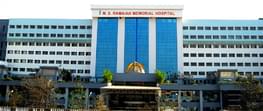RGUHS B.Sc Medical Laboratory Technology: Fees 2025, Course Duration, Dates, Eligibility
Bangalore, KarnatakaState UniversityEstd 1996
Course Finder
Compare
Claim this college
Eligibility Criteria
Candidate should have passed two years Pre University Examination conducted by Dept. of Pre – Uni. Education, Karnataka State with English as one of the subjects and Physics Chemistry and Biology as an optional sub. The candidates shall have passed subjects of English, Physics, Chemistry and Biology individually also and must not have obtained less than 45% marks in PCB.
Course Finder
Search from 20K+ Courses and 35+ Streams
Clear
Popular Streams:
Discover More Colleges




![East Point Group of Institutions - [EPGI]](https://image-static.collegedunia.com/public/college_data/images/appImage/1646729844Screenshot20220308141524.png?h=111.44&w=263&mode=stretch)

![Acharya Institute of Health Sciences - [AIHS]](https://image-static.collegedunia.com/public/college_data/images/appImage/1494493753cvr.png?h=111.44&w=263&mode=stretch)


![Rajiv Gandhi University of Health Sciences - [RGUHS]](https://image-static.collegedunia.com/public/college_data/images/logos/1422461688lo.png?h=71.7&w=71.7&mode=stretch)











![Acharya Institute of Health Sciences - [AIHS]](https://image-static.collegedunia.com/public/college_data/images/logos/1494493753logoedt.png?h=72&w=72&mode=stretch)
![Sapthagiri Institute of Medical Sciences and Research Centre - [SIMSRC]](https://image-static.collegedunia.com/public/college_data/images/logos/1469080306Capture logo et.png?h=72&w=72&mode=stretch)



![Indira Gandhi Institute of Child Health - [IGICH]](https://image-static.collegedunia.com/public/college_data/images/logos/14691048631.gif?h=72&w=72&mode=stretch)


![Dr. S.R. Chandrasekhar Institute of Speech and Hearing - [SRCISH]](https://image-static.collegedunia.com/public/college_data/images/logos/139790188010409.JPG?h=72&w=72&mode=stretch)



Comments